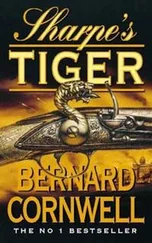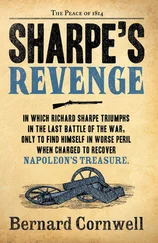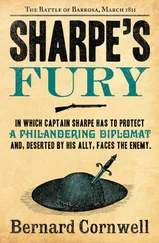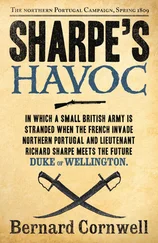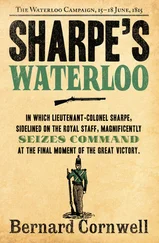The Tippoo Sultan. The enemy. The tyrant of Mysore and the man who was presumably directing the gunfire on the ridge. The Tippoo ruled Mysore and he was the enemy, but what he was, or why he was an enemy, or whether he was a tyrant, beast or demigod, Sharpe had no idea. Sharpe was here because he was a soldier and it was sufficient that he had been told that the Tippoo Sultan was his enemy and so he waited patiently under the Indian sun that was soaking his lean tall body in sweat.
Captain Morris leaned on his saddle’s pommel. He took off his cocked hat and wiped sweat from his forehead with a handkerchief that had been soaked in cologne water. He had been drunk the previous night and his stomach was still churning with pain and wind. If the battalion had not been going into battle he would have galloped away, found a private spot and voided his bowels, but he could hardly do that now in case his men thought it a sign of weakness and so he raised his canteen instead and swallowed some arrack in the hope that the harsh spirit would calm the turmoil in his belly. ‘Now, Sergeant!’ he called when the company in front had moved sufficiently far ahead.
‘Forward half-company!’ Hakeswill shouted. ‘Forward march! Smartly now!’
Lieutenant Lawford, given supervision of the last half-company of the battalion, waited until Hakeswill’s men had marched twenty paces, then nodded at Sergeant Green. ‘Forward, Sergeant.’
The redcoats marched with unloaded muskets for the enemy was still a long way off and there was no sign of the Tippoo Sultan’s infantry, nor of his feared cavalry. There were only the enemy’s guns and, high in the fierce sky, the circling vultures. Sharpe was in the leading rank of the final half-company and Lieutenant Lawford, glancing at him, thought once again what a fine-looking man Sharpe was. There was a confidence in Sharpe’s thin, sun-darkened face and hard blue eyes that spoke of an easy competence, and that appearance was a comfort to a young nervous lieutenant advancing towards his first battle. With men like Sharpe, Lawford thought, how could they lose?
Sharpe was ignorant of the Lieutenant’s glance and would have laughed had he been told that his very appearance inspired confidence. Sharpe had no conception of how he looked, for he rarely saw a mirror and when he did the reflected image meant nothing, though he did know that the ladies liked him and that he liked them. He knew, too, that he was the tallest man in the Light Company, so tall, indeed, that he should have been in the Grenadier Company that led the battalion’s advance, but when he had first joined the regiment, six years before, the commanding officer of the Light Company had insisted on having Sharpe in his ranks. Captain Hughes was dead now, killed by a bowel-loosening flux in Calcutta, but in his time Hughes had prided himself on having the quickest, smartest men in his company, men he could trust to fight alone in the skirmish line, and it had been Hughes’s tragedy that he had only ever seen his picked men face an enemy once, and that once had been the misbegotten, fever-ridden expedition to the foggy island off the coast of Flanders where no amount of quick-wittedness by the men could salvage success from the commanding general’s stupidity. Now, five years later, on an Indian field, the 33rd again marched towards an enemy, though instead of the enthusiastic and generous Captain Hughes, the Light Company was now commanded by Captain Morris who did not care how clever or quick his men were, only that they gave him no trouble. Which was why he had brought Sergeant Hakeswill into the company. And that was why the tall, good-looking, hard-eyed private called Richard Sharpe was thinking of running.
Except he would not run today. Today there would be a fight and Sharpe was happy at that prospect. A fight meant plunder, what the Indian soldiers called loot, and any man who was thinking of running and striking up life on his own could do with a bit of loot to prime the pump.
The seven battalions marched towards the ridge. They were all in columns of half-companies so that, from a vulture’s view, they would have appeared as one hundred and forty small scarlet rectangles spread across a square mile of green country as they advanced steadily towards the waiting line of guns on the enemy-held ridge. The sergeants paced beside the half-companies while the officers either rode or walked ahead. From a distance the red squares looked smart, for the men’s red coats were bright scarlet and slashed with white crossbelts, but in truth the troops were filthy and sweating. Their coats were wool, designed for battlefields in Flanders, not India, and the scarlet dye had run in the heavy rains so that the coats were now a pale pink or a dull purple, and all were stained white with dried sweat. Every man in the 33rd wore a leather stock, a cruel high collar that dug into the flesh of his neck, and each man’s long hair had been pulled harshly back, greased with candle wax, then twisted about a small sand-filled leather bag that was secured with a strip of black leather so that the hair hung like a club at the nape of the neck. The hair was then powdered white with flour, and though the clubbed and whitened hair looked smart and neat, it was a haven for lice and fleas. The native sepoys of the East India Company were luckier. They did not cake their hair with powder, nor did they wear the heavy trousers of the British troops but instead marched bare-legged. They did not wear the leather stocks either and, even more amazing, there was no flogging in the Indian battalions.
An enemy cannonball at last found a target and Sharpe saw a half-company of the 33rd broken apart as the round shot whipped through the ranks. He thought he glimpsed an instant red mist appear in the air above the formation as the ball slashed through, but maybe that was an illusion. Two men stayed on the ground as a sergeant closed the ranks up. Two more men were limping and one of them staggered, reeled and finally collapsed. The drummer boys, advancing just behind the unfurled colours, marked the rhythm of the march with steady beats interspersed with quicker flourishes, but when the boys marched past the twin heaps of offal that had been soldiers of the Grenadier Company a few seconds before they began to hurry their sticks and thus quickened the regiment’s pace until Major Shee turned in his saddle and damned their eagerness.
‘When are we going to load?’ Private Mallinson asked Sergeant Green.
‘When you’re told to, lad, when you’re told to. Not before. Oh, sweet Jesus!’ This last imprecation from Sergeant Green had been caused by a deafening ripple of gunfire from the ridge. A dozen more of the Tippoo’s smaller guns had opened fire and the crest of the ridge was now fogged by a grey-white cloud of smoke. The two British galloper guns off to the right had unlimbered and started to return the fire, but the enemy cannon were hidden by their own smoke and that thick screen obscured any damage the small galloper guns might be inflicting. More cavalry trotted forward to the 33rd’s right. These newcomers were Indian troops dressed in scarlet turbans and holding long, wicked-pointed lances.
‘So what are we bleeding supposed to do?’ Mallinson complained. ‘Just march straight up the bloody ridge with empty muskets?’
‘If you’re told to,’ Sergeant Green said, ‘that’s what you’ll do. Now hold your bloody tongue.’
‘Quiet back there!’ Hakeswill called from the half-company in front. ‘This ain’t a bleeding parish outing! This is a fight, you bastards!’
Sharpe wanted to be ready and so he untied the rag from his musket’s lock and stuffed it into the pocket where he kept the ring Mary had given him. The ring, a plain band of worn silver, had belonged to Sergeant Bickerstaff, Mary’s husband, but the Sergeant was dead now and Green had taken Bickerstaff’s sergeant’s stripes and Sharpe his bed. Mary came from Calcutta. That was no place to run, Sharpe thought. Place was full of redcoats.
Читать дальше

